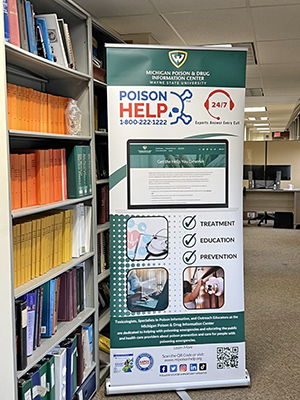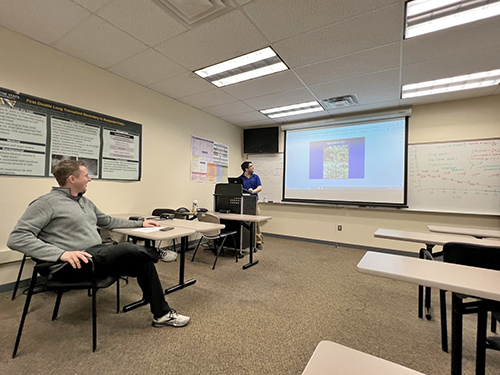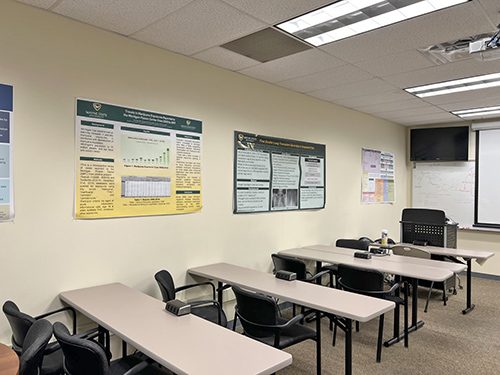There are 55 poison control centers in the United States; the only one in the state of Michigan, established in 1958, resides in Detroit and is run by Wayne State University. The Michigan Poison and Drug Information Center at the Wayne State University School of Medicine, a nationally-accredited poison center with America’s Poison Centers, provides free expert medical advice to the state, public, hospitals, EMS professionals, and all health care providers in Michigan regarding poison-related emergencies. This includes providing information on drug interactions, drug mixtures, drugs of abuse, new drug trends, animal-related reactions — snakes, spiders, scorpions and bees — and plants and mushrooms — EGLE.
 Operating 24 hours a day, seven days a week, 365 days a year, the center triages, diagnoses and treats more than 70,000 exposures to chemicals, drugs, environmental toxins, gases and envenomations each year.
Operating 24 hours a day, seven days a week, 365 days a year, the center triages, diagnoses and treats more than 70,000 exposures to chemicals, drugs, environmental toxins, gases and envenomations each year.
“Not only do we manage a high load of cases, free of charge, we save the state more than $30 million dollars annually,” said Varun Vohra, clinical toxicologist and managing/academic director of the Center. “Our biggest functions are to keep people out of the hospital, reduce health care costs and save the state money. On top of reducing ICU overutilization, resource allocation and hospital admission costs, we educate laypersons and healthcare workers and provide risk assessments for recalls, ground water, chemical spills and environmental hazards.”
As part of the Department of Emergency Medicine within the Wayne State University School of Medicine, the center is staffed by a team of well-trained specialists — physicians, nurses, pharmacists and other health care professionals — in addition to six board-certified toxicologists.
“A toxicologist is always on call,” said Dr. Vohra, an assistant clinical professor of WSU Emergency Medicine. “We will always assist our callers, regardless of the time of day.”
The center also provides bedside service at the Detroit Medical Center for patients who require hands-on intervention or physicians who need in-person consultation with toxicologists.

From food and medication safety to substance use disorder and the opioid epidemic, experts are a national resource — and not just for the public. In addition to handling calls from around the state, the center also functions as a much-needed resource to Michigan’s emergency room physicians, treating patients who have been injured, or children who have been unintentionally exposed to drugs or toxins.
Thousands of physicians call the center each year for advice and guidance in how to treat patients, Dr. Vohra said.
The center serves as a clinical education rotation for Wayne State’s medicine and pharmacy students, as well as a medical toxicology fellowship program.
The center’s experts also play an important role in public health.
“It’s our job to inform the public of what's out there and where people can get into danger” Dr. Vohra said. “And not just with drugs, but also substances like carbon monoxide and other environmental hazards.”
This includes increasing the public’s consciousness and awareness regarding things like drugs and the opioid epidemic by frequently providing pertinent information for media.

“It’s a multi-pronged approach that starts with the individual patient and enhances public health. We provide all those who require our services with a professional toxicology-based consultation. From there, that knowledge is passed on to clinicians and then can be used to treat and protect other patients,” Dr. Vohra said.
Observing, managing and addressing patterns pertaining to the sale and use of illicit drugs is a component of the center’s portfolio. Rumored rainbow Fentanyl in children’s Halloween candy this year was one of the most recent instances in which the center was a sought-after source of reliable information. In instances like that, Dr. Vohra urged the public to remain aware and alert.
“As the only poison and drug information center in the state, we take a great deal of pride and responsibility in being a trusted resource for Michigan’s residents when it comes to anything from an accidental ingestion, an intentional overdose, a public health concern, or a learning opportunity for our future health professionals,” he said.
The Michigan Poison and Drug Information Center at the Wayne State University School of Medicine provides expert advice and information at no cost to callers. Donate online to help support services by the center.
